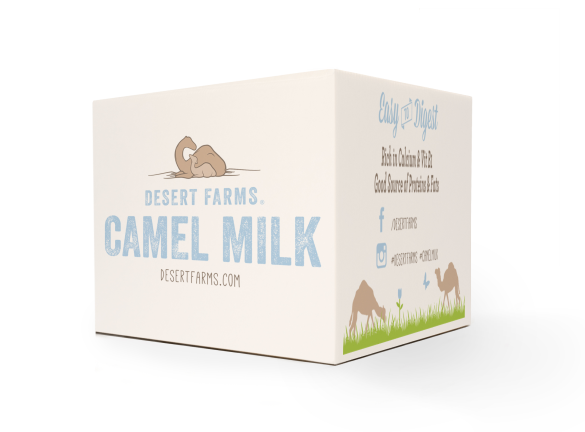Camel Milk vs. Goat Milk: Nutrition & Health Benefits
Understanding Camel Milk Nutrition
The first question most people have often revolves around camel milk nutrition. has five grams of protein per cup, which equates to 10% of the suggested daily intake of protein. Aside from it being only 110 calories per serving, here are the other nutrients [hyperlink “Camel Milk Nutrition Facts] packed in camel milk:
- Potassium
- Calcium
- Folate
- Phosphorus
- Thiamin
- Zinc
- Selenium
What Nutrients Are in Goat Milk
In one glass of goat milk, you get these minerals:
- Calcium: 327 milligrams (33 percent DV)
- Phosphorus: 271 mg (27 percent DV)
- Magnesium: (34.2 mg (9 percent DV)
- Potassium: 498 mg (14 percent DV)
- Copper: 0.1 mg (6 percent DV)
- Zinc: 0.7 mg (5 percent DV)
And you get these vitamins with one glass:
- Vitamin A: 483 IU (10 percent DV)
- Vitamin B2 (Riboflavin): 0.3 mg (20 percent DV)
- Vitamin C: 3.2 mg (5 percent DV)
- Vitamin D: 29.3 IU (7 percent DV)
Camel Milk vs. Goat Milk
Goat milk has less calcium, iron, protein, and vitamin A, but is also lower in carbs, cholesterol, and sodium than camel milk.
Fat molecules in goat milk are much smaller than the fat molecules in cow milk
Fat globules of goat milk resemble those of cow milk in lipid composition and properties of the globule membrane, but goat milk lacks agglutinin, which causes fat globules of cow milk to cluster when cooled. That’s what you see float to the top when you leave fresh cow milk out. And this is also what makes goat and camel milk better for digestion than cow milk.
Camel and goat milk are naturally homogenized
Homogenization is a process that occurs after pasteurization, where the fat molecules in milk is broken down to resist separation. Being homogenized means it is uniform in consistency.
Since goat and camel milk have smaller fat globules, they make for a more homogenous mixture of fat in the milk. And for human health, natural homogenization of goat milk is better for digestion than mechanically homogenized cow milk products.
What is a Casein Allergy
Casein is a protein that can be found in all mammals’ milk and dairy products. A casein allergy happens when your body’s immune system mistakenly thinks casein is harmful and produces allergic antibodies for protection.
The interaction between these antibodies and casein triggers the release of chemicals like histamine and can cause symptoms like these:
- Skin reactions such as hives, rashes, or itchy skin
- Swelling of the lips, throat, tongue, mouth, or face
- Sneezing, runny nose, itchy eyes, coughing, wheezing, or nasal congestion
- Anaphylaxis, a life-threatening reaction that happen very quickly
Genetic polymorphisms of milk proteins play an important role in eliciting different degrees of allergic reactions. Goat milk lacking α-s1-casein, which is the main casein in cow milk, is less allergenic than goat milk with α-s2-casein, which is more typical for many goat breeds and camels.
Goat milk has been recommended as a substitute for people who are allergic to cow milk. About 40 to 100 percent of patients allergic to cow milk proteins tolerate goat milk. Babies suffering from gastrointestinal allergy and chronic enteropathy against cow milk were reportedly cured by goat milk therapy. One study showed that camel milk was safer than goat milk for feeding children with cow milk allergy.
Camel Milk and Autism
It has also been found that the high levels of magnesium, zinc, and vitamin E in camel milk can increase glutathione production, which helps decrease oxidative stress in people with autism. Magnesium is known to reduce oxidative stress and enhance vitamin E and C absorption, while zinc increases total glutathione levels.
Some parents saw improvements in their autistic children after drinking camel milk. They had better sleep, increased motor planning and spatial awareness, increased eye contact, better language, and improved gastrointestinal function.
Camel Milk and Diabetes
Research has shown that camel milk has been used in the Middle East to treat, prevent, and control diabetes. Camel milk also doesn’t cause a rise in blood sugar, and has been shown to work as insulin therapy to improve long-term glycemic control and allows patients with type-1 diabetes to reduce insulin intake.
Benefits of Camel Milk
It’s no surprise now that camel milk is packed with nutrients to help you meet many of your daily recommended intake of certain minerals and nutrients. But camel milk also has other noteworthy benefits to consider.
The composition of camel milk comes closest to that of human milk compared to other milks, making it safe to feed camel milk to babies and children.
If you have a cow milk allergy or intolerance, camel milk is a great option since it lacks the A1 casein protein and lactoglobulin found in cow milk.
The monounsaturated fats in camel milk give it some of the same benefits as olive oil. It also contains A2 beta casein, which is different than the A1 casein found in most dairy milk. The A2 beta casein may be responsible for protective effects on the heart and immune system.
Where To Buy Camel Milk
You can buy camel milk from Desert Farms, or at one of these locations [hyperlink to “Where To Buy Camel Milk].
